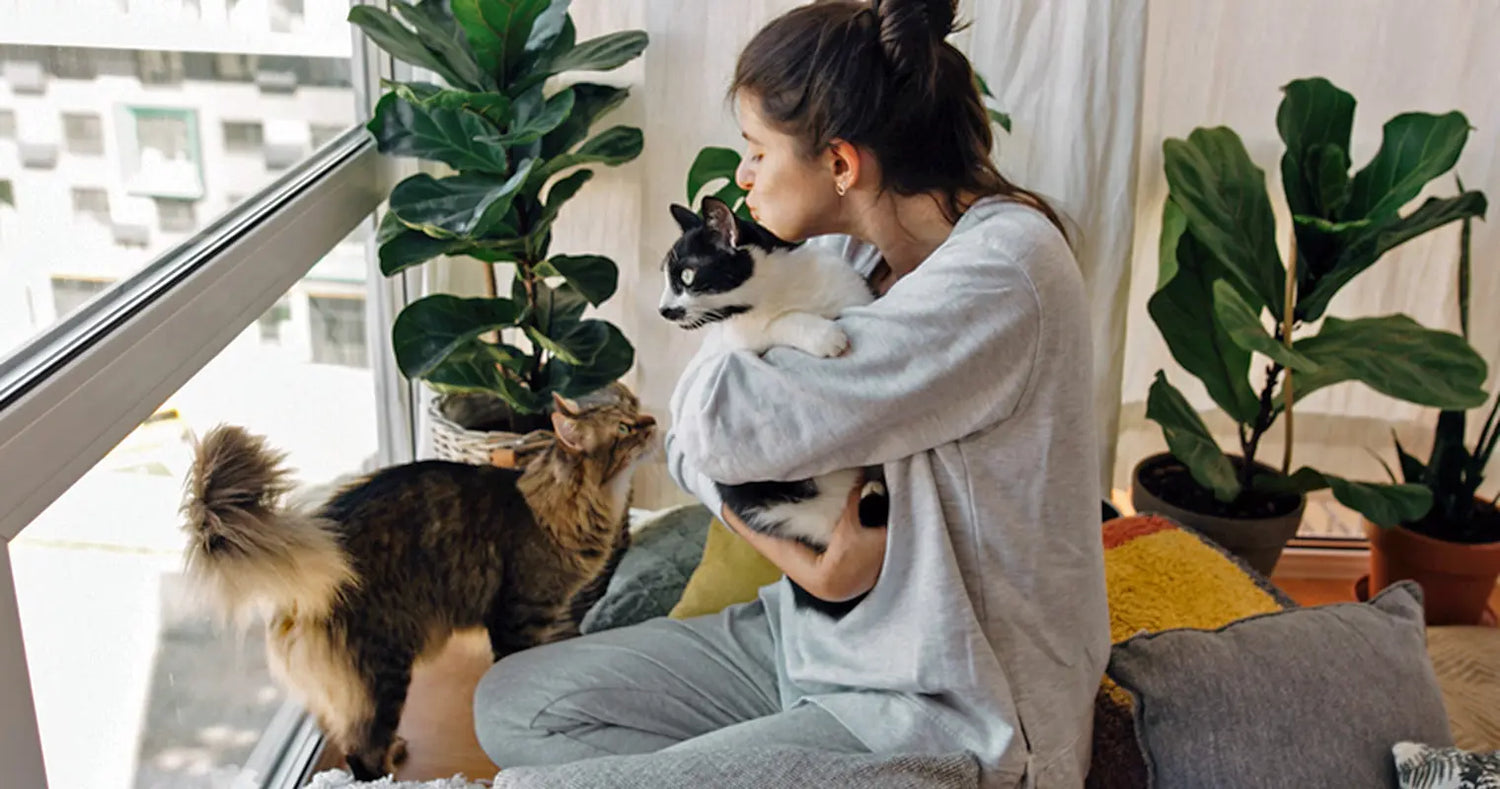If you’re considering getting your cat a feline buddy, you’re in the right place.
Ever wonder if your cat gets lonely? We all know the buddy system works for humans, but what about cats and kittens?
Scientists have a few different ways of defining loneliness, but it basically means the feeling of being alone or a lack of social interaction. Similar to humans, cats can feel lonely. More interaction with their humans or other companions can help.
Below, let’s explore why many shelters encourage adopting kittens in pairs, as well as when a second cat could be a meaningful addition to your single-cat home.
Do cats get lonely?
Facts: Cats and kittens can get lonely. Kittens need at least one feline buddy early in life to help them develop into well-mannered adults, notes cat behaviorist Rachel Geller. Adopting kittens as solo cats too early can negatively affect their behaviors, which experts like Geller call single kitten syndrome. As for adult cats, Geller says they can sometimes feel lonely too.
“Separation anxiety usually happens when there is a schedule change, and the owner goes from being home on a predictable routine to being away for a long time,” Geller explains.
When adopted alone, kittens are more likely to have behavioral issues as they grow, in contrast to kittens adopted in pairs or into a home with another young cat, according to Jackie Noble, senior director of behavior at the San Diego Humane Society’s Nursery and Foster. During their first six months of life, kittens need feline companionship for play and bonding.
Signs your cat is lonely
If your cat has been spending more time alone and is acting out of sorts, they could be lonely. “Although a lot of people think of cats as solitary animals, there are many multi-cat households in which companion cats love each other,” Geller says. They may play together and groom each other. Some may even sleep with tails and paws draped over each other.
Here are some signs your cat is lonely and could benefit from a buddy:
-
Increased vocalization
-
Litter-box issues
-
Changes in appetite
-
Destructive behavior
-
Excessive grooming
-
Unexplained vomiting
-
Restlessness or agitation
-
Clingy behavior
Any of the above signs could also indicate a medical condition in cats. So before considering a feline friend, schedule a checkup with your veterinarian.
Is it okay to have one cat?
If you’re feeling guilty about having just one cat, Geller points out that some adult cats truly prefer solo living. This is especially true for cats who are territorial, easily scared, don’t do well with change, or have aggressive tendencies. Similar to aging humans, many senior cats often prefer solitude and familiar routines. However, Noble warns that if you want to adopt a solo kitten, be prepared to spend lots of time taking the place of their feline companion.
Is it too late to get a second cat?
There’s this unspoken assumption that when a cat reaches a certain age, they’ll never adapt to sharing a home with another furry companion. Geller says that’s not necessarily the case, although all situations should be evaluated on an individual basis.
For example, senior cats aren’t always open to the rambunctious nature of a kitten. In that scenario, Noble recommends adopting two kittens rather than one. This way, the kittens can entertain one another and give your senior kitty a break when needed.
Welcoming home another cat should always begin with a proper introduction. This sets the stage for a positive relationship between your cats. Starting with structure can lend way to tolerance — even friendship.
Still not sure about adding a second cat to your home? Noble suggests fostering. It’s a great way to test the waters of feline companionship before making an adoption decision. For even more details, check out our step-by-step guide on how to foster a cat or kitten.
Tips to help a lonely kitty
Maybe adopting a second cat isn’t right for you or your cat right now, but your kitty seems lonely. Don’t worry, there are ways to remedy this. Here are five ways to help your lonely kitty if adopting a pal is not an option.
1. Establish a routine
Cats crave predictability. Establishing a consistent schedule for feeding, playtime, and alone time helps them feel secure. Noble recommends that if you’ve recently adopted your cat or plan to adopt a single cat, ask the shelter about the cat’s current routine — which food they eat and when, the litter they prefer, and when playtime usually occurs — and try to stick to that once they’re home.
2. Combat boredom while you’re away
As Noble says, “A tired kitten is a well-behaved kitten,” and the same can be said for adult cats, too. Before leaving the house, wear your cat out with a good play session using interactive toys like wand toys or feather teasers.
For best results, Geller says to really get into the game by manipulating the wand to look like prey. When it’s time to wrap up playtime, slowly decrease the intensity of your movements, as if the prey is getting tired or is wounded. This leaves your cat feeling like a proud predator. Once the prey is subdued (i.e. the toy stops moving), end the session with a treat or a small portion of your cat’s food. This sequence is sure to get your cat ready for a nap.
Even though cats sleep a lot — Noble estimates 13 to 16 hours total, when you consider their many naps — they’ll likely wake up looking for something to do. Provide scratching posts, climbing structures, and puzzle feeders to keep them busy. Offer crinkle tunnels and motion-activated toys for solo play.
3. Gradual desensitization to time alone
Shelly Raber, a cat foster coordinator at MaxFund No-Kill Animal Shelter, recommends spending as much time at home as possible during the first week after adopting a cat or kitten to help them adjust. After that, you can begin to leave for brief periods and gradually increase how long you spend away from home.
4. Practice calm goodbyes and happy reunions
Rather than making a big fuss when you leave home, save it for your return. Greet your cat with affection, cuddles, and belly rubs (if that’s their thing). Pets miss their humans when they are away, Raber says, and a warm welcome shows them you’re happy to be back.
5. Consider a pet sitter
If you have long workdays, a pet sitter can provide much-needed companionship and ensure your cat’s well-being while you’re away. In general, Geller says healthy adult cats shouldn’t spend more than 24 hours alone, while kittens should be limited to a maximum of four hours of solo time a day.
Commonly asked questions
Are cats happier in pairs?
Kittens do best with a feline friend during their first six months. While it might seem like double the trouble, companionship is important for their development and helps prevent single kitten syndrome, which can manifest as excessive scratching, vocalization, or aggressive behaviors. As for adult cats, their preference for companionship varies by individual personalities and life history.
Do cats get lonely at night?
Cats are crepuscular, meaning they’re most active at dawn and dusk. Still, despite their reputation for being nocturnal party animals, their natural cycle also includes sleeping at night. If your cat is disrupting your sleep, try a pre-bedtime play session followed by a small meal.
Do cats get lonely when you go to work?
While domesticated cats have retained some independent instincts, they’ve also developed a need for human companionship. This means they can form strong bonds with us and might miss us when we leave for work. But this isn’t always the case, especially if you stick to a predictable routine and your cat has plenty of enriching activities while you’re gone.
Are cats solitary?
While some cats may prefer a life of solitude, many indoor cats benefit from a feline companion. Given ample space and resources (food, water, litter boxes, and yes, sunbeams!), cats can thrive in social settings. This can be witnessed in outdoor cat colonies or even multi-cat households.
Do cats get lonely without another cat?
Yes, it’s possible for cats to get lonely without another cat. Domestic cats are actually quite social. This social nature means they can experience loneliness when left alone for too long. Cats may even feel lonely and mourn the loss of a loved one.





